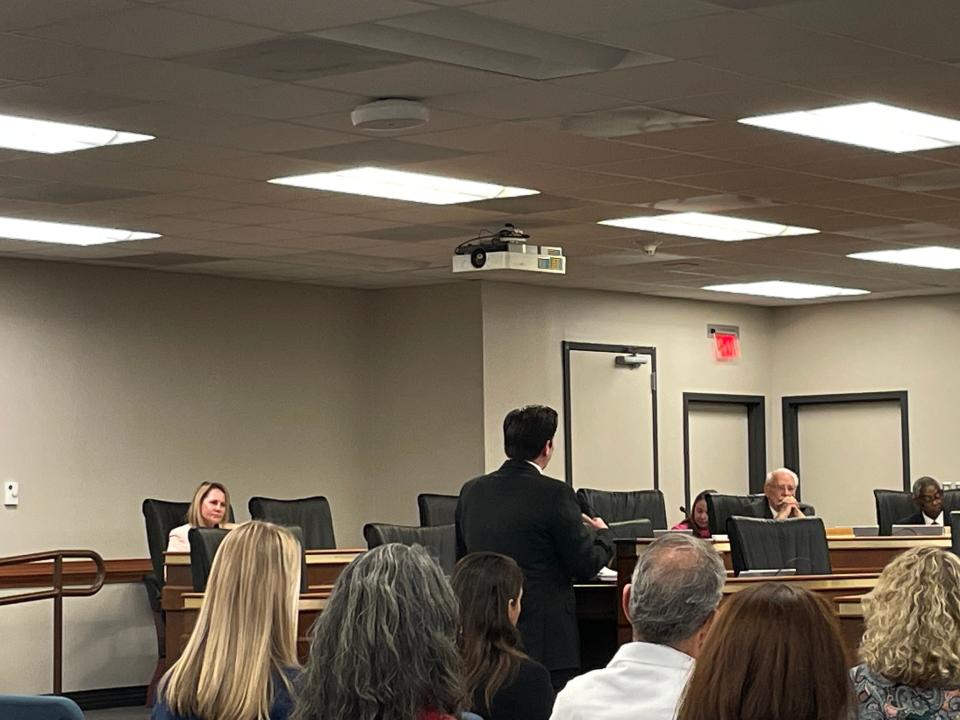SC Senate debates anti-transgender laws that ban gender identity, birth certificate changes
- Oops!Something went wrong.Please try again later.
- Oops!Something went wrong.Please try again later.
South Carolina lawmakers are considering two bills that would ban a transgender child's access to gender-affirming healthcare and restrict transgender residents from being able to change their gender markers on their birth certificate.
Doctors, parents, lawyers and advocates who oppose the Republican-backed effort said Thursday that the language of the bills raises privacy concerns.
The state's move to ban healthcare for minors younger than 18 years of age violated parental rights and the confidential relationship between a doctor, a patient and the child, said Dr. Elizabeth Mack, pediatric expert and South Carolina AAP President.
Doctors in South Carolina don’t perform transition surgeries on children younger than 18 and closing off access to puberty blockers and hormone therapies, they said, would also exacerbate a mental health crisis that disproportionately affects LGBTQ children, she continued.
With birth certificates, Tara Borelli with Lambda Legal and Colleen Condon, a family court lawyer from North Charleston, said this proposal would add more hurdles for a transgender resident and wondered about the discrepancy between getting state and federal documentation amended.
If one could get a new passport by simply checking off a box, why did SC require a family court judge to green flag a change, she asked.
Meanwhile, supporters, several of whom have made the rounds of statehouses in Tennessee and Kentucky, argued the studies related to puberty blockers and hormone therapies were not conclusive.
Their stances diverge from medical opinion by leading associations, such as the American Academy of Pediatrics (AAP), and allege that blockers and hormones cause irrevocable change to a child's psyche.

Efforts to ban gender-affirming care for minors raise questions about SC GOP's mission to preserve parental rights
Sen. Josh Kimbrell, R-Spartanburg, who is a sponsor on both bills, said the gender-affirming healthcare bill was not "about hating anybody," rather it was about "protecting the innocence of kids." The main thrust of his argument was that children do not possess the maturity to know better and should not make life-changing decisions.
"This is not a bill that restricts the right of any adult that can do what he or she desires or chooses to do with their lives," he said about bill S.627, related to gender-affirming healthcare. "This doesn't prevent anybody from having a gender reassignment surgery or hormone replacement therapy as an adult."
The law only outlaws puberty blockers and hormones if it's used to treat gender dysphoria among children. But it would still allow the use of hormones and blockers in other medical cases, which often involve women experiencing menopause and ovarian cysts.
What to know: Gender-affirming care for transgender and nonbinary communities
A provision of the bill also forces school administrators to inform parents when a child starts exhibiting signs of gender dysphoria.
Mack said the provision could risk "outing" a child. This could be a dangerous scenario, Mack said, especially if the child was not ready or comes from a non-supportive household.
Deborah Greenhouse, a Columbia-based pediatrician, said she has treated children as young as four or five who said they are not the sex they were assigned at birth.
"While these children may not understand the adult concept of sex and gender, they know who they are," she said.
"David," a 50-year-old parent from Charleston County and defense contractor with the Navy, chose to only go by his first name during his remarks. He said he had a 14-year-old transgender daughter who was 3-years-old when she started displaying gender non-conforming traits. Uncomfortable in her own skin, David said his daughter started harming herself when she was just 7.
"She would rather die than be a boy," he said.
Both Greenhouse and David detailed the processes parents and their transgender children must go through to get to the point where they are given puberty blockers and hormones. A pediatrician must first diagnose and recommend mental health counseling. A counselor then confirms whether the pediatrician’s diagnosis was correct. Doctors assess the time to start medical treatment.
GOP lawmakers across the U.S. have used controversial studies and statistics to trounce access to gender-affirming healthcare.

Nationwide issue: 11 US states have already introduced bills targeting transgender health care in 2023
Kimbrell said 85% of the people who transition later regretted the decision. Richard McCain, an orthopedic doctor not affected by the proposed law, also used the same statistic as Kimbrell and argued puberty blockers and hormones were a product of “political science” and not "actual science."
Prisha Mosely, 24, said she regretted the transition she made when she was 18 in North Carolina. Though she has de-transitioned back to the sex she was assigned at birth, she said the scars from the surgery are something she will carry for the rest of her life. She gave similar testimony in front of Kentucky state lawmakers.
But Mosely's journey is a rarity according to a host of studies.
A 2021 review of 27 studies, which covered the experiences of nearly 8,000 transgender patients, found that only 1% regretted their transition. Meanwhile, a Jan. 2023 study, touted to be the largest of its kind, found that transgender and non-binary youth using hormones and puberty blockers showed lowered signs of depression and anxiety.
With two vastly different opinions on medical science, it appears South Carolina lawmakers are at another crucial juncture to decide how far parental rights should go.
In 2021, similar votes in Arkansas led to a veto from then-Gov. Asa Hutchinson, who referred to these proposals as an example of government overreach. Meanwhile, an anti-gender-affirming healthcare bill in Alabama is currently blocked by federal court.
Sen. Kevin Johnson, D-Clarendon asked why the state could not leave it to the parents and doctors to decide what was best for children? He brought up education voucher bills and the weeks of debate that followed in January.
If parents could decide what type of book was best for their child to read, why couldn’t they do the same when it came to medical decisions?, Johnson asked.
A 'crisis':1 in 4 Black transgender, nonbinary youths attempted suicide in previous year, study finds
SC GOP proposals for birth certificates could trap transgender residents in a sex they don't identify with
Another bill by Danny Verdin, R-Laurens, and Kimbrell, S. 623, would restrict transgender residents' ability to change their sex. If the bill passes, they can only change their original certificate if it had a clerical error in it or if they had it changed within twelve months of their birth due to a medically verifiable sex development issue.
Tara Borelli with Lambda Legal services said that birth certificates were important legal documents in order to obtain a driver's license and for voting identification, and an accurate birth certificate was especially important for transgender people who already face extraordinary levels of harassment and violence in society.
"Having an inaccurate birth certificate forcibly discloses transgender people to others when it may not be safe," Borelli said, adding that this bill would push South Carolina to join the ranks of the most extreme outliers in the U.S., as very few states have historically have banned updates to birth certificates. "And those states have all been sued," Borelli said.
The second and perhaps the most complex part was the rule related to family court judges.
For transgender residents to change their gender marker in their birth certificate, they have to get a doctor’s note and a court order from a family court judge. Once they have these two pieces of documentation, they can go to DHEC to get the records amended.
Family court lawyer Colleen Condon has represented hundreds of transgender clients who remain in the dark about whether a judge will authorize a change in documentation.
She said most family court judges and lawyers do not have medical degrees. So when clients go to a judge with a case file that was almost always complex, the judges and lawyers failed to understand medical histories and were relying solely on their opinion.
Condon said there is a lack of uniformity and it would aggravate the problem and risk caging a transgender person to a gender identity they do not agree with.
Tenn. Senate OKs push to define 'sex':May risk $1.2B in funding
But there was a solution, Condon said. A DHEC proposal would rely on doctors in the public health agency to peruse a transgender person's medical case file and have the ability to authorize a gender marker change. This would take family courts out of the picture.
If the bill were to advance in its current form, the provisions would inadvertently restrict transgender residents to a sex they don't identify with. No fiscal impact review was submitted, but a similar move in Tennessee put the state in a position to lose over a billion dollars in federal funding.
McCormick lawmaker Billy Garrett wanted to understand why the inability to change the biological sex would matter as much as it does. "Why can't we just put whatever it is if somebody is born as a male, or a female or a female wants to be a male?" he said. "Wouldn't be helpful if everyone knew where everybody stands?
Condon was quick to respond. "I'm not sure anybody needs to know my sexual organs except for my doctors and my intimate partners," Condon said.
Devyani Chhetri covers the South Carolina State House and is a watchdog SC government reporter. You can reach her at dchhetri@gannett.com or @ChhetriDevyani.
.
This article originally appeared on Greenville News: SC Senate debates anti-transgender laws that ban gender identity changes

